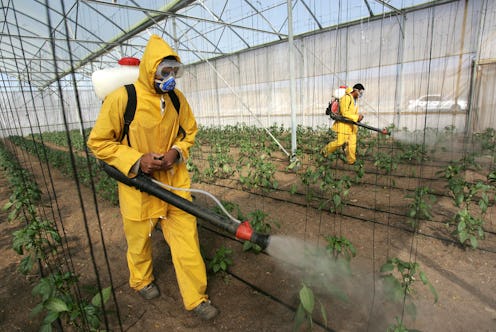News
Pesticides Linked to Endometriosis
We've got some bad news about dairy and fish: A new study, published Tuesday in journal Environmental Heath Perspectives, indicates that two banned pesticides still persist in "measurable levels" in dairy and fish products — and those level could play a role in the development of endometriosis. The condition is marked by uterus tissue growing outside of the uterus itself, attaching itself to nearby organs or structures, like fallopian tubes or ovaries.
Researchers looked at 248 women who had been diagnosed with endometriosis, as well as 538 who didn't have the condition (the latter served as the control group.) In blood samples of both groups, elevated levels of the two pesticides, mirex and beta HCH, were found to correlate with an increased risk of endometriosis, even though the chemicals have been banned for decades. Mirex and beta HCH are two examples of what's known as organochlorine pesticides, the most famous being DDT: a popular insecticide that was discovered to be a carcinogenic, thanks to groundbreaking 1962 book Silent Spring, and quickly banned. Organochlorine pesticides, amongst all the other bad stuff, have also been shown to alter hormone production and negatively affect genitalia. Nearly all varieties of the pesticide group have been severely restricted or banned in the U.S since the sixties.
High exposure to the pesticide mirex came with a 50 percent greater risk of endometriosis, and high levels of beta HCH came with a 30 to 70 percent higher risk of the z. Findings stayed accurate even after the study was adjusted for other variables.
"The take-home message from our study is that persistent environmental chemicals, even those used in the past, may affect the health of the current generation of reproductive-age women with regard to a hormonally driven disease," Upson said.
And endometriosis is no fun for those who have it: It causes painful periods and severe PMS, as well as chronic back pain, and can eventually lead to infertility. Besides the symptoms indicative of its presence, endometriosis is also the umbrella for a host of other related conditions, meaning increased vulnerability to mono, hypothyroidism and several types of cancers.
"It's plausible that organochlorine pesticides could increase the risk of an estrogen-driven disease such as endometriosis," Upson said. "We hope our findings will help inform current global policymaking to reduce or eliminate their use."
